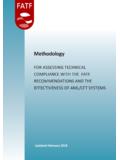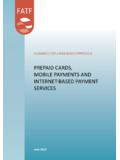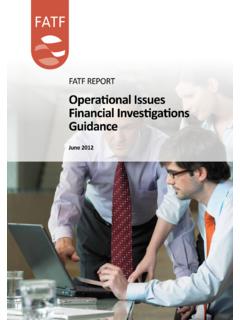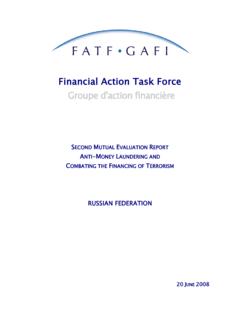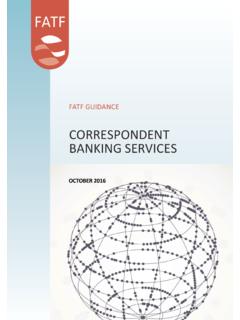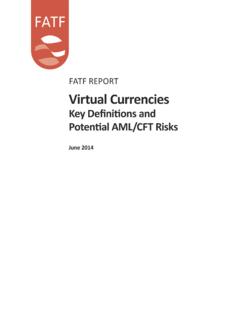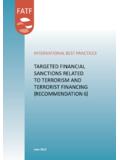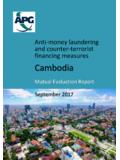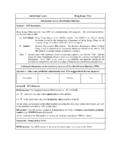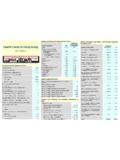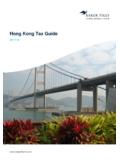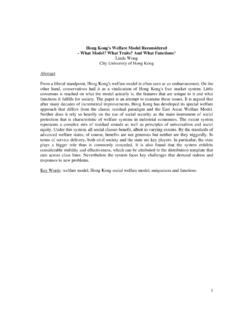Transcription of Mutual Evaluation of Hong Kong, China – 4th …
1 4TH FOLLOW UP REPORT. Mutual Evaluation of hong kong , China 19 October 2012. FINANCIAL ACTION TASK FORCE. The Financial Action Task Force (FATF) is an independent inter-governmental body that develops and promotes policies to protect the global financial system against money laundering, terrorist financing and the financing of proliferation of weapons of mass destruction. The FATF Recommendations are recognised as the global anti-money laundering (AML) and counter-terrorist financing (CFT) standard. For more information about the FATF, please visit the website: 2012 FATF/OECD. All rights reserved. No reproduction or translation of this publication may be made without prior written permission. Applications for such permission, for all or part of this publication, should be made to the FATF Secretariat, 2 rue Andr Pascal 75775 Paris Cedex 16, France (fax: +33 1 44 30 61 37 or e-mail: Photocredits coverphoto: Thinkstock Mutual Evaluation OF hong kong , China 4TH FOLLOW-UP REPORT.)
2 Mutual Evaluation OF hong kong , China - 4TH FOLLOW-UP. REPORT. Application to move from regular follow-up to biennial updates Note by the Secretariat I. INTRODUCTION. 1. The third Mutual Evaluation report (MER) of hong kong , China was adopted on 11 July 2008. At the same time, hong kong , China was placed in a regular follow-up process 1. hong kong , China reported back to the FATF in June 2010 (first follow-up report), and June 2011 (second follow-up report). In June 2012, hong kong , China indicated that it would report to the Plenary again in October 2012 concerning the additional steps taken to address the deficiencies identified in the report, and apply to move from regular follow-up to biennial updates. 2. This paper is based on the procedure for removal from the regular follow-up, as agreed by the FATF plenary in October 2008 and subsequently amended.
3 The paper contains a detailed description and analysis of the actions taken by hong kong , China in respect of the core and key Recommendations rated partially compliant (PC) or non-compliant (NC) in the Mutual Evaluation , as well as a description and analysis of the other Recommendations rated PC or NC, and for information a set of laws and other materials (included as Annexes). The procedure requires that a country has taken sufficient action to be considered for removal from the process To have taken sufficient action in the opinion of the Plenary, it is necessary that the country has an effective AML/CFT. system in force, under which the country has implemented the core 2 and key3 Recommendations at a level essentially equivalent to a Compliant (C) or Largely Compliant (LC), taking into consideration that there would be no re-rating 4.
4 hong kong , China was rated PC or NC on the following Recommendations: Core Recommendations rated PC (no core recommendations were rated NC): , , Key Recommendations rated PC (no key recommendations were rated NC). , , Other Recommendations rated PC. , , , , , ,R. 34 , SR. VII. Other Recommendations rated NC. , , , SR IX. 1 2 The core Recommendations as defined in the FATF procedures are , , , , and 3 The key Recommendations are , , , , , , , , , and 4 FATF Processes and Procedures par. 39 (c). 2 2012 OECD/FATF. Mutual Evaluation of hong kong , China 4th Follow-Up Report 3. As prescribed by the Mutual Evaluation procedures, hong kong , China provided the Secretariat with a full report on its progress. The Secretariat has drafted a detailed analysis of the progress made for Recommendations 3, 5 and 10, and Special Recommendations I, II and III (see rating above), as well as an analysis of all the other Recommendations rated PC or NC.
5 A draft analysis was provided to hong kong , China (with a list of additional questions) for its review, and comments received. The final report was drafted taking into account some of the comments from hong kong , China . During the process hong kong , China has provided the Secretariat with all information requested. 4. As a general note on all applications for removal from regular follow-up: the procedure is described as a paper based desk review, and by its nature is less detailed and thorough than a Mutual Evaluation report. The analysis focuses on the Recommendations that were rated PC/NC, which means that only a part of the AML/CFT system is reviewed. Such analysis essentially consists of looking into the main laws, regulations and other material to verify the technical compliance of domestic legislation with the FATF standards.
6 In assessing whether sufficient progress had been made, effectiveness is taken into account to the extent possible in a paper based desk review and primarily through a consideration of data provided by the country. It is also important to note that these conclusions do not prejudge the results of future assessments, as they are based on information which was not verified through an on-site process and was not, in every case, as comprehensive as would exist during a Mutual Evaluation . II. MAIN CONCLUSIONS AND RECOMMENDATIONS TO THE PLENARY. CORE RECOMMENDATIONS. 5. For R. 5 and for R. 10, all the technical deficiencies in the legislation were addressed with the entry into force of the relevant provisions of the new anti-money laundering legislation (AMLO).
7 Positive progress has been made with the definition and implementation of a sectoral risk assessment, but questions remain on the justification for one of the exempted business sectors (money lenders). The overall compliance of hong kong , China with R. 5 can be assessed at a level essentially equivalent to LC. The regime put in place by the AMLO to monitor and supervise the money service sector will be kept under review with regard to effectiveness. hong kong , China 's compliance with R. 10 can be assessed at a level essentially equivalent to LC. With regard to SR. II, all technical deficiencies have been addressed with the entry into force of the United Nations (Anti- Terrorism Measures) Ordinance (UNATMO), with the exception of the potential broad application of the civil protest' exemption to certain classes of 'terrorist acts'.
8 hong kong , China 's compliance with SR II can be assessed at a level essentially equivalent to LC. KEY RECOMMENDATIONS. 6. On , part of the technical deficiencies in the legislation was addressed with the entry into force of the relevant provisions of the UNATMO, and initiatives taken to improve the effectiveness of the restraint and confiscation framework. However, progress is not yet complete and does not fully address all the deficiencies. The restraint and forfeiture procedure is still limited by a threshold; the recognition of environmental crimes and piracy as predicate offences is not clearly established and this impacts the confiscation powers, including on instrumentalities, that can apply to these 2012 OECD/FATF 3. Mutual Evaluation OF hong kong , China 4TH FOLLOW-UP REPORT.
9 Offences. hong kong , China ' s overall compliance with R. 3 can be assessed at a level essentially equivalent to LC. With regard to SR. I, the UNATMO and the AMLO addressed most of the technical deficiencies. One of the remaining deficiencies noted for SR II ( civil protest' exemption, see par. 5). has an impact on hong kong , China 's compliance with SR I. Overall, compliance with SR. I can be assessed at a level essentially equivalent to LC. For SR. III., although some of the technical deficiencies were addressed with the entry into force of the UNATMO and the United Sanctions (Afghanistan) Regulations (UNSAR), there are some remaining deficiencies, with regard to the obligations required with respect to assets under the control of designated entities; the freezing requirements of terrorist property; and the effect which can be given to freezing mechanisms of other jurisdictions.
10 In addition, Guidance provided to institutions concerning their obligations under freezing mechanisms is insufficient. The overall compliance of hong kong , China with SR. III can be assessed at a level essentially equivalent to PC. OTHER RECOMMENDATIONS. 7. hong kong , China has made significant progress with the other 13 Recommendations that were rated PC or NC. hong kong , China has achieved a sufficient level of compliance with Recommendations 6, 9, 11, 17, 29, and SR. VI and VII. hong kong , China has also made efforts to improve its compliance with Recommendations 12, 16, 24, 33 and 34 and SR. IX although deficiencies remain and implementation of these recommendations has not yet reached a level equivalent to an LC rating. CONCLUSIONS.

